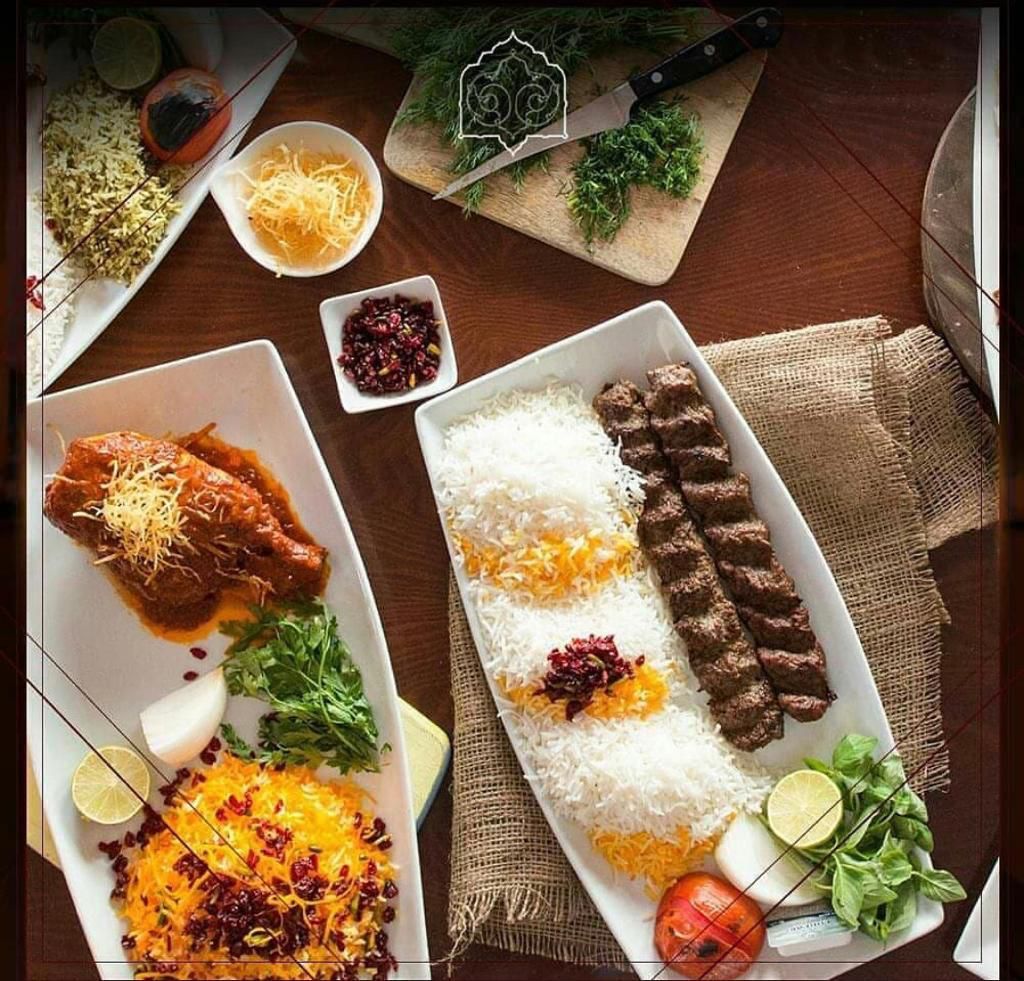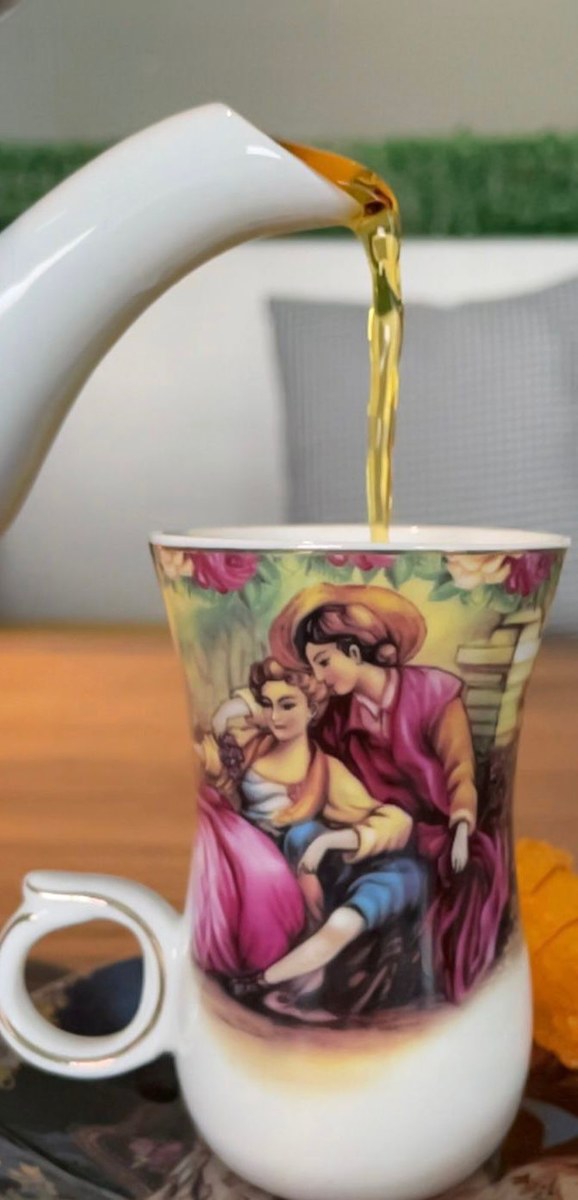RIYADH: Persian cuisine is popular around the world for its healthy, hearty and luxurious dishes.
The aromatic and flavorful cuisine includes perfectly cooked fluffy rice, grilled or stewed meat such as chicken, lamb, goat or fish, and vegetables that are enhanced by a variety of nuts, fruits, herbs and rich spices like cardamom, saffron, cinnamon, cloves, sultanas, berries and dried rose petals, among others.
Bordered by Iraq, Turkiye, Azerbaijan, Armenia, Afghanistan, Pakistan, Oman and Turkemenistan, Iran comprises diverse ethnicities, with neighboring countries having a huge influence on its food.
Popular Persian dishes include ghormeh sabzi, chelo kabab, dizi, kabab koobideh, khoresht gheymeh, zereshk polo, tahdig, faloodeh and tulumba, among others.

The undated photo shows chelo kabab, a popular dish by Isfahani, a Persian restaurant in Saudi Arabia. (Photo courtesy: Isfahani)
Renowned Saudi food blogger Hisham Baeshen is known for his cooking videos on Instagram. With about 4 million followers, Baeshen makes dishes from around the world, including Saudi Arabia.
Baeshen said that he has cooked Persian food, with his favorite being the national dish of Iran — ghormeh sabzi, a stew prepared with meat and kidney beans with a side dish of zereshk polo, a mixture of white and saffron flavored basmati rice topped with barberries.
“I consider sabzi as the king of Persian foods. With a side order of zereshk rice, which I consider one of the staple dishes in Persian food,” Baeshen told Arab News.
Drawing similarities between Saudi and Persian cuisine, the blogger said: “I would absolutely recommend Saudis cook Persian food at home, because all the materials that you need for the Persian kitchen are available in the Saudi kitchen and the techniques used in cooking Persian food are not very different than the Saudi cuisine.
“Many people have tried Persian recipes and loved them. Honestly — very beautiful and delicious.”
Here are some restaurants in the Kingdom offering a taste of Persia on a plate.
Founded in 1990 in Bahrain, Isfahani has expanded its presence to eight locations across Bahrain and in the Eastern Province of Saudi Arabia, with branches in Dhahran and Alkhobar.
Ahmed Alqaseer, vice president of Isfahani group, said that Isfahani started when his uncle, Elias, gave his father, Jalil Alqaseer, the business.
Ahmed’s father took it upon himself to learn more about Persian culture from top Persian chefs by visiting Iran and Lebanon.
“The most important thing for us is to explore and share is the quality of the food. We keep on tracking, developing and adding more dishes,” Ahmed said.
With many great options to choose from, chelo kabab remains by far the the most popular choice among diners.
“Chelo kabab is the dish that gets the most recommendations and gets sold out the quickest in Isfahani locations and food delivery applications like Talabat,” Alqaseer said.
Isfahani’s target for 2023 is to expand to new locations and focus on its design, ambience and food.
“I want the customers to have a great restaurant experience and taste, as if they are in another world. We keep on developing the food and getting new recipes all while maintaining the quality of the food. The new restaurant will have customers will feel like they are in a very modern Persian restaurant,” Alqaseer added.
Mohammed Abduljabar is the owner of Zahra Zad, one of the only Persian restaurants in Al-Qatif.

The undated photo shows Saffron tea served at Zahra Zad, a Persian restaurant in Al-Qatif, Saudi Arabia. (Photo courtesy: Zahra Zad)
“We decided to open a Persian restaurant because we saw that there weren’t any in the city of Qatif. The people of the city love Persian food and we wanted to give them something to indulge in,” said Abduljabar.
The soft opening of the restaurant, which is adorned with paintings highlighting Persian culture, architectural style and clothing, took place in February this year.
“We try to capture the true essence and atmosphere of a traditional Persian restaurant through these paintings and decorations. We have all sorts of paintings that symbolize Persian society and dress. Additionally, we added Persian music to add to the ambience.
“I think before starting any project, it is very important for us to study the culture thoroughly so that project truly succeeds,” Abduljabar said.
He added that the most popular dishes are mixed Persian grills — a mixture of beef and chicken kabab — and kashk bademjan, a Persian eggplant dip.
To satisfy one’s sweet tooth, Zahra Zad offers saffron cake and bastani sonati, a rich pistachio ice cream with saffron and rose water.
Taking accessibility and inclusivity into consideration, Abduljabar has kept its ground floor exclusive to people who are unable to climb stairs.
To make the restaurant attractive for customers of all ages, Zahra Zad also contains a shisha cafe.
Alshaya is another Persian restaurant with branches in Riyadh and the Eastern Province. Started in 1999, Alshaya has expanded to nine locations around the Kingdom. The restaurant offers traditional Persian dishes such as kabab, sultani steak and morgh chicken kabab, among others.




























